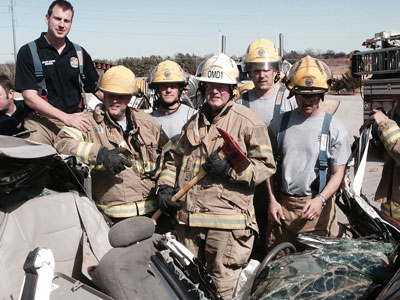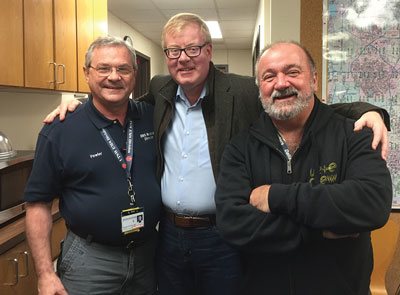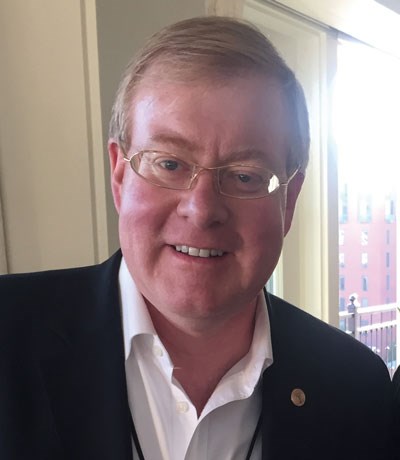
EMRA President, 1996-1997
EMRA Board of Directors, 1995-1998
ACEP Councillor 2008-2015
ACEP Alternate Councillor 2016-
Oklahoma College of Emergency Physicians Vice President 2012-2015
Oklahoma College of Emergency Physicians President 2016-
ACEP Emergency Medical Services Committee Chair 2016-2018
Medical School: Texas Tech University Health Sciences Center
Residency: Methodist Hospital of Indiana/Indiana University School of Medicine
Fellowship: EMS – The University of Texas Southwestern Medical Center at Dallas
Current Position: Professor, EMS Section Chief & Director of the Oklahoma Center for Prehospital & Disaster Medicine, Department of Emergency Medicine, University of Oklahoma School of Community Medicine in Tulsa. Medical Director, EMS System for Metropolitan Oklahoma City and Tulsa, including the Emergency Medical Services Authority (EMSA), the Oklahoma City Fire Department, the Tulsa Fire Department, and a multitude of metropolitan fire and law enforcement agencies.
When Jeff Goodloe served as EMRA President in 1996-1997, the organization had roughly 4,000 members, was building its first-ever website, and was advocating the merits of a proposal that became a resolution approved by the ACEP Council to limit future ACEP membership to emergency medicine residency-trained physicians. Fast-forward 20 years, and EMRA has nearly quadrupled in size. Dr. Goodloe is now a faculty member helping prepare EM residency-trained physicians for today's workforce, and has become a leader in EMS medicine.
 What has surprised you most about the reality of your EM career vs. your expectation of it during residency?
What has surprised you most about the reality of your EM career vs. your expectation of it during residency?
I believe the surprise could be that there hasn't been a “surprised me the most” part of the journey. I'm truly fortunate that I had experienced mentors (some never considered themselves mentors, but they were in their daily words and actions) from my very first days in EMS, through the years working as a paramedic and going to medical school, doing residency, helping to start the EMS fellowship at UT Southwestern, and honestly continuing each and every day. Every day is a myriad of opportunities to learn. Don't miss the opportunities. I didn't honestly think I would be in the academic position I'm privileged to get the chance to earn its responsibilities every day, though good “luck” can happen if you'll work very hard.
How did being involved in EMRA affect your career path?
EMRA service was an incredible opportunity to see a bigger picture of what a lifetime career in emergency medicine can allow an individual to contribute. More than 80,000 direct patient encounters into my career, there's still nothing like the dynamic that instantly occurs between emergency physician and patient. So it's not an “either/or” choice for me. I love taking care of patients AND I love teaching — EMTs, paramedics, nurses, medical students, residents, fellows — AND I love supporting an EMS system that makes life better for hundreds of thousands of citizens AND I love helping to advance our specialty through ACEP. Being deeply involved in EMRA helped me to see the power of “AND” in abundance in a career.
What do you wish you had known then that you know now?
Balance. There's only 24 hours in a day. Residency is by design out of balance because there is so much core knowledge and skill development to impart within 3-4 years. However, even in those years, I could have been better balanced. I wouldn't change a thing in the past though. Change one aspect of your life and how do you know what the effect is going to be 1 year from now — let alone 20+ years down the road? What I can do now is be more mindful about my own health to be able to be around to help others as long as I can. My No. 1 expectation for EMTs, paramedics, and residents is to take care of their own mental and physical health. If they aren't taking care of that, how can they fully, accurately help others?
 Best advice for residents today?
Best advice for residents today?
When I graduated medical school, Dr. Donald Gordon (former Medical Director, San Antonio Fire Department) told me to never pass up the opportunity to see one more patient and learn from them. Sounds a bit trite, but I think he shared something really wonderful with me. We all need teachers, podcasts, web resources, apps, peer-reviewed journals, textbooks, etc., but patients are the best educators. I'd add to Dr. Gordon's advice to make sure you are learning emergency medicine for what I believe is THE right reason: making a positive difference in times of perceived and actual medical crisis. Lots of easier options are there for better financial gain and fame. Nothing will “pay” you more than knowing you made a real difference for someone who can't reimburse the bills sent and won't even remember your name, if they were even conscious to do so anyway.
You've been involved in emergency medical services since 1988, and now you're chair of the ACEP EMS Committee. What's the driving force behind all your work with EMS?
EMS professionals are some of the best souls on Planet Earth. Are they human? Yep. Do they make mistakes of the mind? Yep. Do they make mistakes of the heart? Yep. And they are still incredibly wonderful to support. I dreamed about being on the “other side of the radio” early on in my EMS career. What a journey to doing that. EMS is also a great “force multiplier” for an emergency physician. In a typical ED shift, you might personally manage 20-50 patients over 10-12 hours. We get the privilege of taking care of that many patients in our local EMS system within an hour. I don't get to directly see most of those patients, even if I'm responding alongside some of our EMTs and paramedics, but I get to be a small part of all of those encounters because of how I encourage, support, and educate EMS professionals.
Why volunteer?
Someone more insightful than I encouraged all of us that meaningful life isn't what you take out of it for yourself, it's what you put into it for others. ACEP isn't an evil empire any more than it is the panacea for all the stressors upon our specialty today. What ACEP has proven to me to be is a door that if you will walk through it, look around, find some work that needs to be done or at least raise your hand when asked who is willing to do some work”¦well, what a great collective of individuals who share the bond of being willing to do some very hard work on the easiest of days in emergency medicine. Why wouldn't someone want to help their fellow souls in this collective endeavor? Here's the bonus part that you'll find once you start: ACEP staff professionals are the best we could hope that exist. I hope every emergency medicine resident makes the opportunity to contribute regularly throughout their career. Maybe it's EMRA. Maybe it's ACEP. Maybe it's both or perhaps another organization. Volunteer with a good heart and you'll find you will get non-financial rewards far above whatever you give in time and effort.
Reading advice for residents?
Here's where my Chair/Program Director seizes, so someone get some lorazepam and levetiracetam handy: Ditch the academic reading. Well, temporarily put it aside. Read these to make you a better leader and person: “Leadership Gold” by John C. Maxwell and “Wooden on Leadership” by John Wooden and Steve Jamison. If you don't know who either of these men is, change that today. Seriously. You'll be better for it. (By the way, my Chair/Program Director, Dr. Bo Burns, gets this, too. You'd get similar advice if you asked him. That's a big part of why I choose to stay where I am teaching. There's a valuable message right there if you think about it.)
Favorite kind of vacation?
Mentally and physically away from work! Work hard. Play hard. Work harder than you thought you could and then enjoy well-deserved time away. You do incredible things for others at work; do different incredible things and create incredible experiences for your loved ones and for you away from work. We are witnesses to life abruptly ending for so many. Make sure you do the incredible whenever you can for those you love. That's what you'll remember most in the end and will help you live a life of no regrets.
Last thought?
On every obituary you'll see a date of birth, then a “dash,” then a date of death. What are you doing with your “dash” today?



